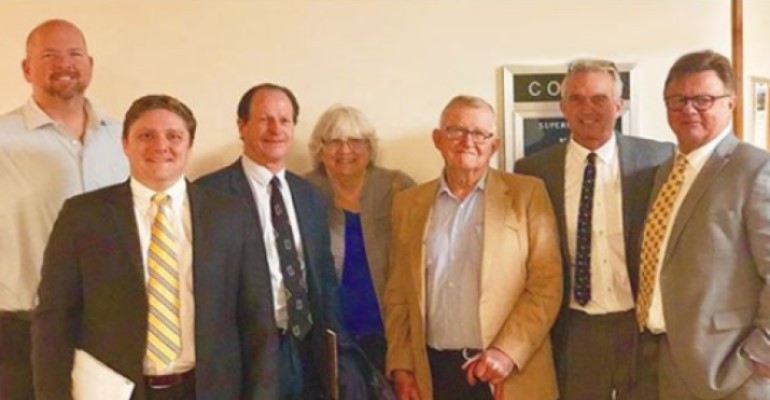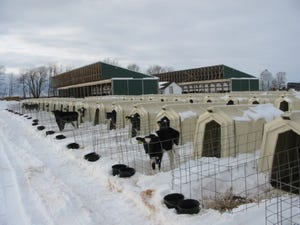Jury awards couple $2b in Roundup lawsuit
Bayer disappointed with jury’s decision and will appeal verdict in this case, which conflicts with EPA’s safety findings for glyphosate.

An Alameda, Cal., jury in the case of Pilliod et al. vs. Monsanto Co. returned a verdict May 13 of $2.055 billion in favor of a husband and wife with non-Hodgkin lymphoma (NHL), ordering Monsanto to pay $55 million in compensatory damages and $2 billion in punitive damages ($1 billion each) for what it claimed was failing to warn consumers that exposure to Roundup weed killer causes NHL.
This was the first Roundup NHL lawsuit from the California Roundup Judicial Council Coordination Proceedings (JCCP) to go to trial. More than 250 Roundup cancer cases filed in California state courts were consolidated in the Roundup JCCP before Judge Winifred Smith in the Superior Court of the State of California for the County of Alameda.
In a statement, Bayer said it is disappointed with the jury’s decision and will appeal the verdict in this case, which conflicts directly with the U.S. Environmental Protection Agency’s interim registration review decision released just last month: The consensus among leading health regulators worldwide is that glyphosate-based products can be used safely and that glyphosate is not carcinogenic, and their favorable conclusions are based on 40 years of extensive scientific research.
The first Monsanto Roundup trial, Dewayne “Lee” Johnson vs. Monsanto Co., resulted in a $289.2 million jury verdict last August. The judge later upheld the jury’s verdict but reduced the punitive damages award, bringing the total award to $78.5 million. The second case, Edwin Hardeman vs. Monsanto Co., resulted in an $80 million jury verdict against the agrochemical company.
Plaintiff Alva Pilliod suffers from NHL in his bones that spread to his pelvis and spine. He was diagnosed in 2011. Alberta Pilliod received her NHL brain cancer diagnosis in 2015. The couple started using Roundup in the 1970s and continued using the herbicide until only a few years ago. The Pilliods retained the Miller Firm to represent them in their case against Monsanto and filed suit in 2018. Miller Firm senior partner Michael J. Miller and Baum Hedlund attorney R. Brent Wisner represented the Pilliods at trial.
“We have great sympathy for Mr. and Mrs. Pilliod, but the evidence in this case was clear that both have long histories of illnesses known to be substantial risk factors for non-Hodgkin’s lymphoma, most NHL has no known cause and there is not reliable scientific evidence to conclude that glyphosate-based herbicides were the ‘but for’ cause of their illnesses, as the jury was required to find in this case,” Bayer said.
Following the jury's announcement in a press conference, Alberta said she wished Monsanto had warned them ahead of time about the dangers of using Monsanto's Roundup and that there was something on the front of the label informing her of the risks. "From their ads, we felt it was incredibly safe to use," she said, noting that they've been fighting cancer for nine years. "It was caused by Roundup; it has changed our lives forever. We can't do the things we used to be able to do. We really resent Monsanto for that fact," she added.
Bayer -- which recently acquired Monsanto, the original maker of Roundup -- said the contrast between this verdict and EPA’s conclusion that there are “no risks to public health from the current registered uses of glyphosate” could not be more stark.
“EPA’s conclusion is based on a database of more than 800 studies on glyphosate and Bayer’s glyphosate-based herbicides that relate to human and mammalian health, and its 2017 cancer risk assessment also examined numerous studies in the open literature. In contrast, plaintiffs in this case presented the jury with cherry-picked findings from a tiny fraction of the volume of studies available and that failed to adjust for exposure to other pesticides, did not have statistically significant results, had very small exposed populations and/or are at odds with the full body of science,” Bayer added. "Plaintiffs also relied heavily on [the U.N. International Agency for Research on Cancer’s (IARC)] assessment of glyphosate from 2015, but as EPA noted, EPA’s cancer assessment was ‘more robust’ and ‘more transparent’ than IARC’s review, which considered only a subset of published studies included in EPA’s evaluation. IARC’s opinion remains an outlier among international health regulators and scientific bodies."
Bayer noted that the verdict in this trial has no impact on future cases and trials, as each one has its own factual and legal circumstances. Also, this litigation will take some time before it concludes because no case has been subject to appellate review, where key legal rulings in the trials will be assessed.
“The company will continue to evaluate and refine its legal strategies as it moves through the next phase of this litigation, which will be marked by a greater focus on post-trial motions and appellate review and trials scheduled in different venues,” Bayer stated.
About the Author(s)
You May Also Like



.png?width=300&auto=webp&quality=80&disable=upscale)

